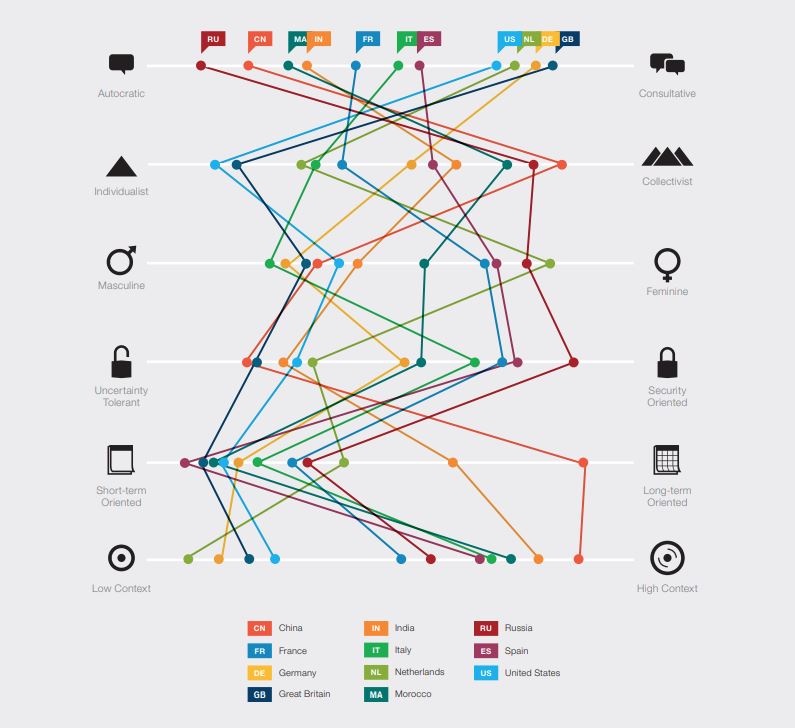How to Fairly and Effectively Manage a Global Workforce: 9 Tips
The difficulties and advantages of managing a global workforce

The trend toward globalisation has, in recent decades, enabled the flourishing of international business. Today, it’s not just the mega-corporations like Coca-Cola, Nike and IBM which are enjoying the benefits of hiring abroad; smaller, independent companies are able to do so, too. However, managing a global workforce also comes with its fair share of challenges.
Pros
Hiring internationally gives you access to a range of benefits, including:
- Entry into new markets
- Asynchronous work
- Higher average quality talent pool
- Increased international brand awareness
Cons
On the flip side, growing a global workforce also has its downsides:
- Staff training can be more complex or costly
- Labour and tax law compliance is intricate and penalties for non-compliance are steep
- Different time zones make synchronous work difficult to coordinate
- Language barriers can be difficult to overcome
- There are many more cultural and religious nuances to be aware of
In this article, we aim to help you overcome the challenges of managing a global workforce, turning your weaknesses into your strengths.
Mauve Group’s top 9 tips for how to successfully manage a global workforce
As experts in the fields of global business expansion and hiring talent abroad (both independent contractors and full-time employees), Mauve Group have compiled a list of 9 helpful tips to aid you in the management of your international team.
Tip #1: Be mindful of cultural differences both in and out of the workplace
With access to the top talent in your field, anywhere in the world, comes exposure to many thousands of new and unique cultural mores. It is increasingly important to be aware and mindful of these, for culture effects not only our social behaviours outside the workplace, but also the way we like to do our work.
For example, whilst The Economic Times explains that arriving 15 minutes late to a meeting in India is still considered ‘on time’, doing so in the UK would be deemed unprofessional. In France, French workers are legally not obliged to respond to work emails outside of work hours, whilst Japanese ‘salary-man’ culture promotes work around the clock. A kiss on the cheek is a standard professional greeting in Argentina, in China it’s a bow, and in the USA a handshake will suffice.

Mapping of 11 work cultures – “Culture Code” by Steelcase
Equality, diversity and inclusion are three core tenets of the modern workplace, and should be applied across the board when expanding internationally. Here are three ways you can ensure that sensitivity to other cultures is engrained throughout your management and employee roll.
Training
Cultural awareness and sensitivity training should be provided to all employees of the business on a regular (e.g. annual) basis. Given that compassionate terminology evolves rapidly, and that your business’s expansion will regularly envelope new cultures, keeping up to date with cultural awareness training is key to your success.
First-person experience
As a CEO or member of upper-management, the best way to get a hands-on appreciation for the cultural differences found within your workforce is to visit the countries in which your business has established offices, employed workers, or engaged the services of contractors.
Multi-cultural events and cultural sharing
Cultural training doesn’t have to be a dry boardroom lecture, it can include exciting, team-binding activities such as the celebration of multicultural festivals, and overseas exchange programmes. Exchanging a team of your employees with those from a different country enables both parties to experience first-hand the cultures of their international col leagues.
Tip #2: Create a workplace equipped to deal with the needs of different faiths
With different cultures come different religions, each with different ways of celebrating and practicing their faiths. Tapping into the full potential of the global talent pool is only possible when you create a welcoming space for all. Currently, half of non-Christians working in the USA say that their employers are ignoring their religious needs.
Offer flexible working weeks and days
Whilst not all religious staff members will require time to practice their devotions during the working day, some will. For example, many Muslims strictly adhere to prayer times, and may require breaks at set intervals each day during which to pray.
Establish inter-faith rooms
Providing your global workforce with dedicated religious practice spaces can be a fantastic way to show people of all faiths that they are welcome and respected in your company.
Offer flexible holidays
International employees are legally entitled to the public holidays of their home country. For example, whilst Christmas is a national holiday in majority-Christian countries like Mexico, and even in majority-atheist countries like Canada, in the likes of China and Japan the Lunar New Year is the more important holiday. Likewise, the holy month of Ramadan is central to the Islamic faith, and is observed by Muslims all over the world.
Tip #3: Comply with the tax and labour laws of different countries
When establishing foreign subsidiaries, or a permanent presence in a foreign country, it is your duty to adhere to the tax and labour laws of that country (rather than the laws of your HQ’s location). As multinational businesses, compliance soon becomes an exceedingly complex issue, given the sheer number of different countries whose laws you must abide by. A simple means of expanding compliantly, whilst avoiding the many potential penalties associated with non-compliance and misclassification of employees, is to use a trusted Employer of Record.
Payroll compliance
Employers are typically responsible for withholding national tax contributions, as well – sometimes – as contributions to health and social insurance, pension schemes, and more. The amount and method of withholding differs by country, and often even by state. Finance departments must be equipped to pay international employees and local tax authorities according to the laws of each country you’ve a professional presence in.
Labour law compliance
In Sweden, both parents of a newborn child are entitled to 240 days of maternity/paternity leave. In contrast, the USA offers zero days of national statutory parental leave. Complying to the often extremely diverse and conflicting labour laws of different countries is part of the juggling act of managing a global workforce.
Classification
It is equally crucial that your HR department is well-versed in the different national laws surrounding classification of employees versus independent contractors. Whilst some countries offer liberal brackets of definition for freelancers, others assume all people contracted to do work on behalf of a company are either full- or part-time employees. Penalties for misclassification (even if accidental) can be severe.
Tip #4: Provide EAL (English as an additional language) support
Native English speakers are lucky, in that English is the internationally-recognised language of business. As such, many workers in non-English speaking countries nevertheless have a strong grasp of the language. Still, non-native speakers often find communicating in English at English-speaking companies to be a handicap, making their working lives more challenging overall. In order to level the playing field for your global workforce, consider offering EAL support to any employees who need it.
Tip #5: Learn the languages, as well as the do’s and don’ts of non-verbal communication
In addition to providing EAL support, you could do a lot worse than to familiarise yourself and your management team with the most commonly-spoken languages of the various countries you’ve expanded into. Furthermore, here are a couple of handy extra tips which can help any multinational to overcome the myriad challenges of language barriers.
Hire local language and English speakers
There are over 230 different languages spoken in Europe alone, with a staggering 2,000+ spoken in Africa. By hiring speakers of local languages and dialects who are also proficient in English, you can effectively bridge the gap between your brand and your new target demographic.
Study non-verbal communication norms in different countries
Many business meetings between members of an international workforce occur over video chat on platforms like Zoom. A great deal of the intricacies of face-to-face communication are lost when we interact like this, and so recognising the “do’s and don’ts” of non-verbal communication becomes even more important.
For example, though the ‘thumbs-up’ gesture is commonplace across the USA, UK, and much of Europe, in Nigeria, the Middle East, and South America it is considered extremely rude. Similarly, in Japan it is rude to laugh without covering your mouth, and it is a show of arrogance in Turkey to gesture with one hand in your pocket.
Tip #6: Avoid cost-cutting when budgeting for international workforce training
With all of the complexities we’ve just described regarding effectively managing a global workforce, the costs of onboarding, training and accommodating international workers can be high. As such, it’s important to budget accordingly. Though it may cost your business more in the short term, in the long run you’ll see the benefits in employee retention, workforce competency, and overall productivity.
Tip #7: Be aware of, and capitalise on, time zone differences
In the emerging post-pandemic world of business, remote work has potentially brought the days of core working hours to a close. Flexibility in the working week can improve employee productivity as well as well-being, and in some countries – such as Finland – has been enshrined in law for decades.
When expanding your business internationally, it’s crucial to be aware of the constraints which time zones can place on synchronous work. At the same time, it’s important to note the many benefits of asynchronous work, so that you can capitalise on them. They include:
- Company work being completed around the clock
- Real-time customer engagement via social media, customer support, etc.
- Communication becoming flexible, no longer confined to core working hours
Tip #8: Adopt a creative, innovative approach to leadership
And speaking of flexibility… A rigid style of leadership and creative direction may work for some businesses, but for those aiming for success as a multinational this is no longer the case. Making flexibility, innovation and adaptability core elements of your business structure and modus operandi ensures that you’re ready to absorb any new challenge arising through global expansion.
Tip #9: Engage the services of an EoR and Global Business Solutions provider
Finally, we would be remiss to end our list of the top 9 expert tips for successfully managing a global workforce without reminding you that you needn’t tackle these challenges alone.
Mauve Group has over 25 years of professional experience assisting all manner of companies on their journeys in international waters. Employing our services – as both an Employer of Record (EoR) and Global Business Solutions provider – could save your business time, money, and stress, whilst ensuring you tap into the full talent and productivity potential available around the world, doing so compliantly at each and every turn.

Countries with highest experienced expat salaries
Where are experienced professionals compensated highest?


What do employees want from remuneration?
Learn why paying competitive salaries can be key to attracting and retaining a motivated, committed, and hardworking team – and how best to do so!
